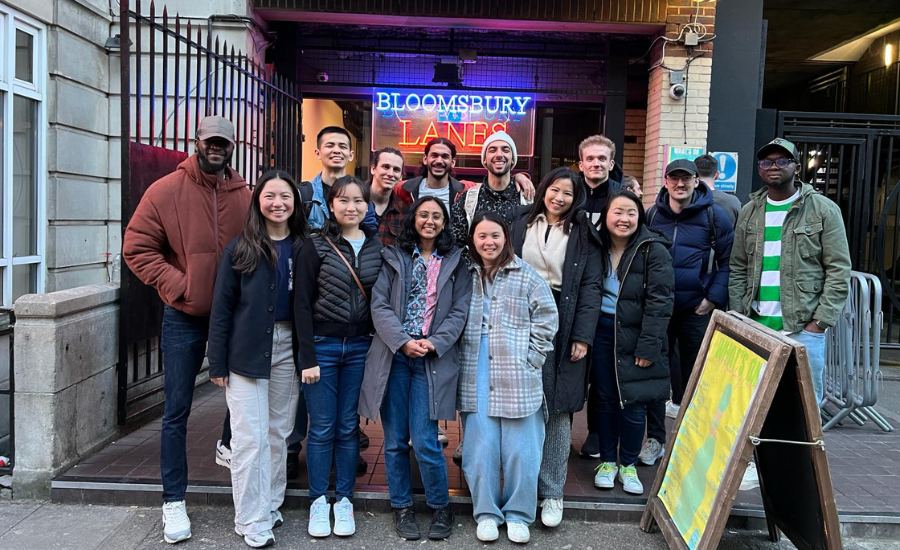Songs that accompany our study - a playlist to light up your day by MSc Health Data Science students
29 May 2024 London School of Hygiene & Tropical Medicine London School of Hygiene & Tropical Medicine https://lshtm.ac.uk/themes/custom/lshtm/images/lshtm-logo-black.png
Listening to music each day keeps the doctor away. The daily average time spent on Spotify was 99 minutes in 2022 in Europe. Is such time spent sufficient for your wellbeing?
The British Academy of Sound Therapy suggests that listening to 78 minutes of music every day is the optimal amount of listening time for wellbeing, or even a 5-minute listening to music from the happiness domain can make one feel happier, as music may lead to the release of dopamine, a feel-good neurotransmitter.
As a student, you may find yourself exceeding the recommended dosage. However, what also matters is the music genres that you enjoy listening to. It's often said that music without vocals is the best study playlist, such as minimalist, classical, instrumental ambient, and low-fi. Yet, during moments of low focus, upbeat energetic songs might surprisingly enhance productivity. Besides, the more you listen to a certain genre only while studying and working, you start to associate it with being productive.
Our playlist
Studying the MSc Health Data Science programme, my classmates are data lovers – but only when the data is not patchy. They especially enjoy getting along with a type of unstructured data – music! Allow me to guide you through our favourite songs on our public playlist on Spotify.
Starting with Dlala Thukzin’s house music, iPlan was the most infectious track in South Africa last year. The lyrics "Get up, get down" from Coffee by Sylvan Esso can provide you with the caffeine boost you need for the day.
Need calming music? Here are the tips. Atmospheric vocals from Patience by Rhye can feel your pain, especially during struggles. Étude by Chopin is a classical remedy for sadness. R&B songs like Eagle Bear Buffalo by Passenger and Lava Lamp by Thundercat also offer a sense of connection and relatability.
Looking for soundtracks for your physical routine? I'll Make a Man Out of You, a Disney song of EDM version, provides upbeat tempos for your workout. Just the Way You Are by Bruno Mars is perfect for your shower song. The disco staple I Will Survive by Gloria Gaynor will transport you back to dance moves in the 70s era, while Togetherness by jazz quintet Ezra Collective brings a vibrant dancing vibe to the night of London.
“Studying at LSHTM was a dream come true”, said an alumnus. YOASOBI, a Japanese pop duo, can help you Tracing a Dream. An Indonesian band Morfem rocks with Rayakan Pemenang, a song about celebrating the achievements of a dreamer.
Have you ever cried since leaving home for London? A song called Nayê in Kurdish by Rewşan talks about travel and nostalgia within a distant folklore. The Burmese song “Eain Co Pyan Kae” by Maung Maung Zaw Latt depicts a journey homeward.
Finally, two tracks for Term 3: Teddy Swims’s Lose Control may help to keep you focused and energized throughout the summer project, while Slept Like A Log, featuring the natural sound of a crackling fire, induces a sense of serenity and relaxation.
Unsurprisingly, pop proves to be the most popular genre among students, as it is with my classmates. By the end of Term 2, we hung out to karaoke and killed the pop songs all the way. Singing karaoke was so good, whether it was because you lost the beat in the middle, missed a note, hit the harmonies together, or amped up the dancing. Singing together, we created memories that will last forever.
What I’ve learned from my classmates’ stories is that music has the magic to encapsulate emotions, evoking memories, desires, fragilities, or dreams – transporting us to unexplored places. Whether in joy or struggle, each track in the playlist reflects personal experiences encountered while studying at LSHTM, serving as a time travel machine for our future selves.
Hope you enjoy this musical world tour.
Listen up: look after your ears
Karaoke and nightclubs are fun, as loud music has become a cultural norm. However, too much loud music can cause Noise-Induced Hearing Loss (NIHL).
So, look after your ears. Limit time exposure to loud environments (> 85 dB). Take regular breaks every hour when listening to music, and using your headphone smartly is key to hearing protection.
Acknowledgements: The author thanks fellow MSc Health Data Science students Jenny, Jasjot, Patricia, Louis, Nikki, Giovanni, Mareca, Joe, Kit Ying, Dhihram, Guzzi, Lana, Soe, Angel, Lamprini for their music recommendations.
- Discover MSc Health Data Science.
- Got a burning question? Contact Kai via our Student Ambassador page.